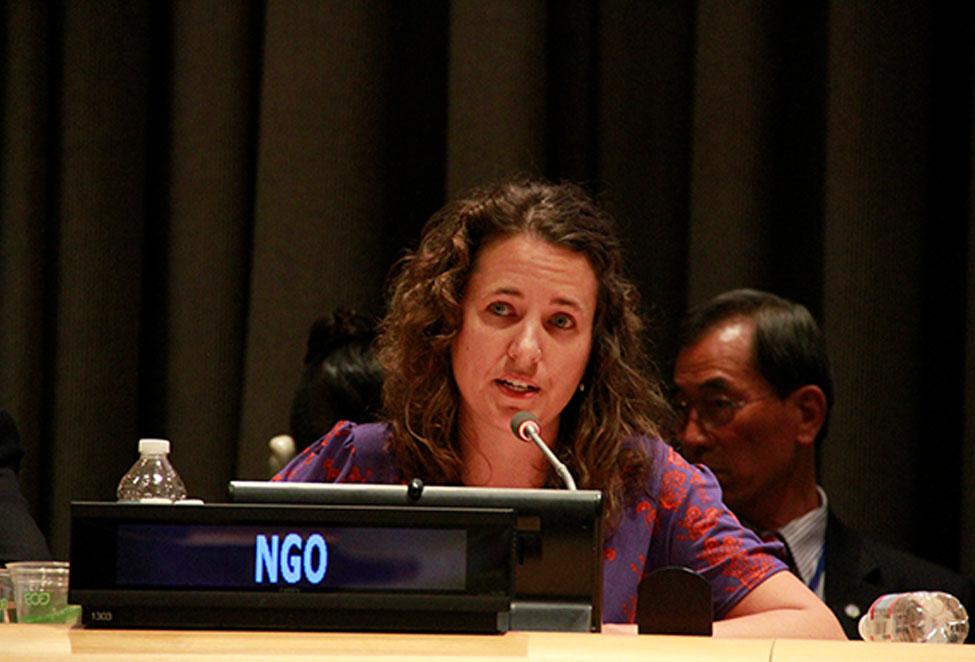
For the latest research and reports from the International Disarmament Institute, visit the reports on our blog.
The International Disarmament Institute encourages Pace faculty and students – as well as collaborators from the scholarly and practitioner communities – to contribute to three streams of research:
- The human and environmental impact of weapons
- Policy pathways of disarmament, arms control and nonproliferation
- Monitoring and evaluation of disarmament policy and programs.
Besides scholarly peer-reviewed publications, this research is disseminated in a variety of forums that enable it to feed into the discussions of a broader audience than just academia. Institute-affiliated researchers publish policy reports and editorials, convene conferences and offer expert testimony on panels at the United Nations.

The Human and Environmental Impact of Weapons
Research conducted within the International Disarmament Institute seeks to establish the humanitarian, human rights and environmental impact of various types of weapons, focusing on those with the most grievous patterns of harm. This aims to establish a credible evidence base for disarmament policymaking.
-
- M. Bolton (2015) “From minefields to minespace: An archeology of the changing architecture of autonomous killing in US Army field manuals on landmines, booby traps and IEDs.” Political Geography.
- M. Bolton. (2015) “Using the Arms Trade Treaty to Address Wildlife Poaching in East Africa: A Human Security Approach.”
- M. Bolton & D. Weir. (2015) “Towards an integrated approach to the material legacies of war: landmines, explosive remnants of war and environmental contamination.” Toxic Weapons of War Project.
- T. McDonnell. (2012) “Sow What You Reap?: Using Predator and Reaper Drones to Target and Kill Suspected Islamic Terrorists.” George Washington University Law Review.
Policy Pathways of Disarmament, Arms Control and Nonproliferation
There are many “pathways” used by diplomats, policymakers, advocates and activists to establish disarmament treaties, regulations, political agreements and custom. Researchers at Pace have aimed to document and theorize the ways that agents in the international system have tried to reshape norms on weapons and violence. Examples of this kind of research at Pace includes:
-
- 2015 Special Section of the academic journal Global Policy on Nuclear Disarmament:
- M. Bolton & E. Minor. “The Humanitarian Initiative on Nuclear Weapons: An Introduction to Global Policy’s Special Section.”
- M. Bolton & E. Minor. “The Discursive Turn Arrives in Turtle Bay: The International Campaign to Abolish Nuclear Weapons’ Operationalization of Critical IR Theories.”
- E. Welty. “The Theological Landscape of the Nuclear Nonproliferation Treaty.”
- R. Acheson. “Foregrounding Justice in Nuclear Disarmament: A Practitioner Commentary.”
- M. Chan. “Non-Nuclear Weapons States Must Lead in Shaping International Norms on Nuclear Weapons.”
- 2014 Special Section of the academic journal Global Policy on the Arms Trade Treaty:
- M. Bolton et al. “The Arms Trade Treaty from a Global Civil Society Perspective: Introducing Global Policy's Special Section.”
- M. Bolton & K. James. “Nascent Spirit of New York or Ghost of Arms Control Past?: The Normative Implications of the Arms Trade Treaty for Global Policymaking.”
- H. Whall & A. Pytlak. “The Role of Civil Society in the International Negotiations on the Arms Trade Treaty.”
- M. Bolton et al. “The Road Forward for the Arms Trade Treaty: A Civil Society Practitioner Commentary.”
- M. Bolton & C. Mitchell. (2014) “The Peloponnesian War and Killer Robots: Norms of Protection in Security Policy.” e-International Relations.
- M. Bolton. (2010) Foreign Aid and Landmine Clearance: Governance, Politics and Security in Afghanistan, Bosnia and Sudan. London, I.B. Tauris.
In addition to peer-reviewed research, Pace faculty and students monitor ongoing disarmament negotiations, particularly in New York, such as the annual UN General Assembly First Committee (Disarmament and International Security). The following represents a small selection of articles and op-eds resulting from this work:
- M. Bolton. (28 November 2015) “Rethinking General and Complete Disarmament.” First Committee Monitor.
- M. Bolton. (18 May 2015) “Disarmament and Non-Proliferation Education.” NPT News in Review.
- T. Deen. (7 May 2015) “Faith-Based Organisations Warn of Impending Nuclear Disaster.” IPS News.
- M. Bolton. (2013) “Arms Trade Treaty: Keeping Weapons from Terrorists and Human Rights Abusers.” The Hill.
- 2015 Special Section of the academic journal Global Policy on Nuclear Disarmament:
Disarmament Program Monitoring, Evaluation and Strategic Planning
The Institute and its associated faculty offer their services to monitor and evaluate compliance with and implementation of disarmament treaties, as well as the effectiveness of programs like demining, decommissioning, confidence-building measures, survivor assistance and risk education. There is a particular focus on understanding the social context and impact of these programs on people. Ray Acheson, head of the Women’s International League for Peace and Freedom’s Reaching Critical Will project, stated:
“Pace University faculty have been very constructively engaged in UN disarmament and arms control processes, particularly through … participation in both intergovernmental meetings and civil society campaigns and initiatives. They have actively contributed to monitoring and analyzing negotiations and discussions on a variety of disarmament issues.”
-
- UN Office for Disarmament Affairs (Ed.). (2016) Rethinking General and Complete Disarmament in the Twenty-first Century.
- UN Development Programme. (2016) “Mine Action for Sustainable Development.”
- UN Development Programme. (2016) “Issue Brief: Development and Mine Action.”
- International Campaign to Ban Landmines – Cluster Munition Coalition. (2016) “Bosnia and Herzegovina: Mine Action.” Landmine and Cluster Munition Monitor 2016.
- International Campaign to Ban Landmines – Cluster Munition Coalition. (2016) “Croatia: Mine Action.” Landmine and Cluster Munition Monitor 2016.
- Norwegian People’s Aid. (2015) Clearing the Mines: Report for the Fourteenth Meeting of States Parties to the Anti-Personnel Mine Ban Convention.
- International Campaign to Ban Landmines – Cluster Munition Coalition. (2015) “Bosnia and Herzegovina: Mine Action.” Landmine and Cluster Munition Monitor 2015.
- International Campaign to Ban Landmines – Cluster Munition Coalition. (2015) “Croatia: Mine Action.” Landmine and Cluster Munition Monitor 2015.
- International Campaign to Ban Landmines – Cluster Munition Coalition. (2014) “Bosnia and Herzegovina: Mine Action.” Landmine and Cluster Munition Monitor 2014.
- International Campaign to Ban Landmines – Cluster Munition Coalition. (2014) “Croatia: Mine Action.” Landmine and Cluster Munition Monitor 2014.
- Norwegian People’s Aid. (2014) Clearing the Mines: Report by the Mine Action Team for the Third Review Conference of the Antipersonnel Mine Ban Treaty.
